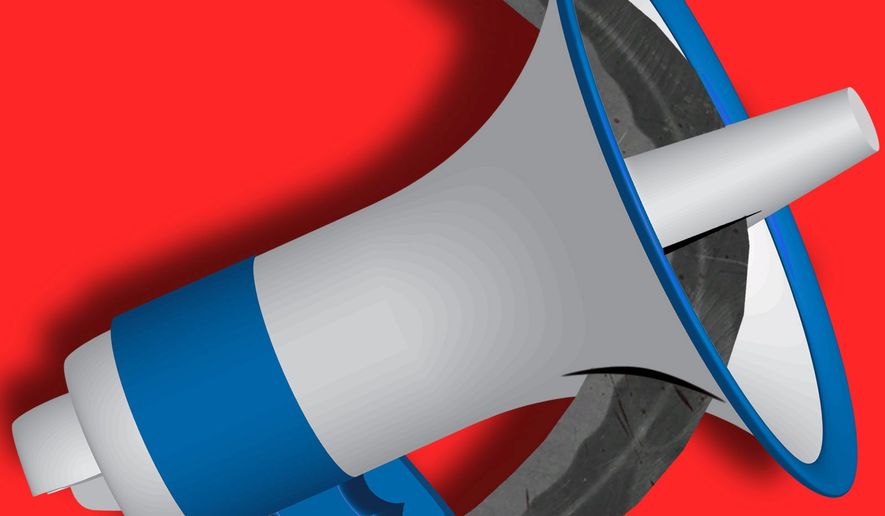OPINION:
Do you have freedom of speech if you have no means of distributing your ideas to large numbers of others? An unprecedented attack on freedom of speech is now underway, primarily by private oligopolists working in concert with their political allies.
Before the fall of socialism/communism in Eastern Europe and the former Soviet Union, I worked with groups within these countries to bring economic and political freedom. At the time, I could not imagine I would have to be involved in efforts within the U.S. four decades later to try to preserve these basic freedoms at home.
The socialists/communists proclaimed that freedom of speech was allowed except for the catch-all of it being illegal to “slander the state.” Slandering the state was code for not being allowed to criticize the system, the Communist Party, or government and party leaders. The penalties could be very harsh, including death.
Communist officials used to claim that citizens had the right to establish newspapers — but there was a catch. All newsprint and printing ink was allocated by the state planning agencies. Without newsprint and ink, it was impossible to create a newspaper. The state planning agencies also allocated printers and controlled distribution for all publications.
In the age of the Internet, the socialist/communist state planning agencies have been replaced by those who control access to and distribution over the Internet — Big Tech. For the past two decades, this weekly column has been published both in the hard print and electronic editions of The Washington Times and elsewhere. The Times holds the copyright but allows distribution by other publications with permission and, of course, private distribution over social media, think tanks, foreign language publications, etc.
I have been very fortunate to have had the privilege to present my thoughts each week in significant publications. To date, I have never been censored (we strive to be responsible and factually correct). But this week for the first time, some of my readers who pass along the column to others via Parler can no longer do so — thus to a small extent reducing the number of those who can “hear” my voice.
Access to Parler was restricted by Apple and Google, but shut down by Amazon (by denial of their cloud servers). Jeff Bezos, arguably the world’s richest man, founded and controls Amazon. Mr. Bezos also owns The Washington Post (a direct competitor of The Washington Times). Mr. Bezos is a very smart man who clearly understands self-interest. No one thinks he bought The Washington Post as a great financial investment. Most likely he bought it as an insurance policy and to have political influence — as was his right.
Even the dullest reporter or editor at The Post can assume, without being directly told, that part of their job is to protect Mr. Bezos, by running critical pieces on those he does not like, whether true or not (as Donald Trump well knows), and to praise the people who can influence what happens to Amazon and the Bezos empire (i.e., the new Biden administration and the congressional Democrats).
The modern idea of “free speech” grew out of the Scottish Enlightenment and was codified in the English “Bill of Rights” in 1689. Virginia was the first state to adopt a “Declaration of Rights” in June 1776, based on the initial draft by George Mason. Section 12 stated: “That the freedom of the press is one of the bulwarks of liberty, and can never be restrained but by despotic governments.”
George Mason refused to sign the U.S. Constitution because it did not include a “Bill of Rights,” and as a result of pressure by Mason and others, a Bill of Rights (the first 10 Amendments) was almost immediately added to the Constitution in December 1791. The 1st Amendment guaranteed the freedom of religion, speech, press, “peacefully to assemble, and to petition the Government for a redress of grievances.”
The major media and tech companies are operating (in economist’s speak) as a collusive oligopoly, in an apparent violation of the anti-trust laws. Private parties that have been harmed and state attorneys general ought to bring suits if the Justice Department fails to act. Some at CNN are trying to shut down Fox News (and Tucker Carlson in particular) by encouraging cable systems to drop them.
What CNN is doing is an improper and perhaps illegal attempt to kill a competitor. Last summer, CNN “personality” Chris Cuomo said on air during one of the violent riots: “Please, show me where it says protesters are supposed to be polite and peaceful,” showing his ignorance of the Constitution. Reviewing the videos, it is clear that some CNN commentators were inciting insurrection — but they still have their jobs.
The stores being burned by the rioters were primarily owned by small, powerless entrepreneurs. CNN is owned by AT&T. Do you think that if the riots, burning and looting were happening in front of the homes of AT&T executives and board members, the CNN on-air people would be condoning them?
The constructive defense against the free speech destroyers is for the freedom-loving wealthy and/or groups of conservatives, libertarians and others to create or buy more newspapers and alternative media so the public has a diversity of news sources. These may not always be good financial investments, but as the American patriots who funded Washington’s army understood, liberty is more important.
• Richard W. Rahn is chairman of the Institute for Global Economic Growth, Fantasy Commodities Inc. and MCon LLC.




Please read our comment policy before commenting.